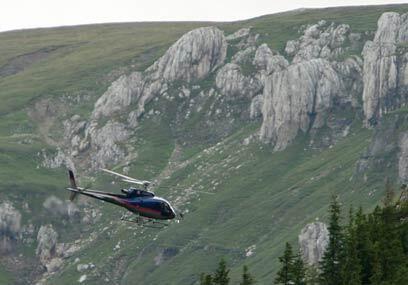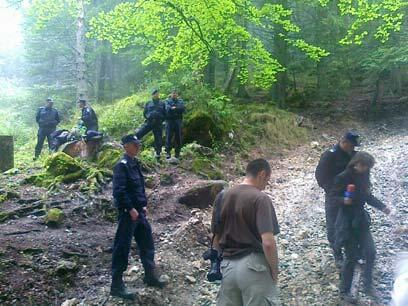ROMANIA - IDF rabbinate representatives completed the process of identifying the six bodies of the IDF soldiers who lost their lives in the helicopter crash in Romania. The victims' families have been notified.
Earlier, members of Rescue Unit 669 recounted the harsh terrain and weather conditions and difficult emotions they endured during the search for their comrades.
The air force is ready to fly the bodies home, apparently within a few hours. The funeral dates are expected to be announced later.
The searches continued over the last 24 hours, leaving rescuers exhausted at the crash site. "We had to go back and forth over the site to find all remains," said one officer. "It was impossible to stand on the steep slope, so we used ropes."
The rescuers said the weather was poor. On Wednesday afternoon torrential rain fell, making their work even harder. In order to reach the crash site, the unit's members, numbering some 50 soldiers, had to climb for an hour and a half from where they had been dropped off by the helicopter.
"It was a hard physical effort, combined with a desire to get to the site and start work," the officer said.
"We had to climb in a stream bed," a team member told Ynet. "We took ladders to climb over the waterfalls and used ropes to avoid slipping on the rocks. We covered an area of some 80 meters by 30 meters (260 x 98 feet), on a slope of 60%, so in many places it was impossible to stand. We spread ropes over the whole area, and in some places worked while harnessed to the ropes. Every few minutes there was a downpour which completely soaked us."
Search underway in Romania (Photo: Reuters)
"It was very important to us to bring them home," he continued. "Nobody stopped in the middle of the work to rest even though we spent 36 hours getting organized and flying, during which we slept maybe two hours. We had to remind people to drink water."
"We are used to saving lives on rescue operations," he explained. "In this case we were dealing with bodies but we understood how important it was to bring them back to their families. At some point, you hope you won't find them dead, but you realize that success in this operation is to find the bodies and send them home, even if it's in coffins. That's the mission."
'We wanted to get them home'
"This is awful work, because you don't want to miss anything, so you go back and forth over the area," A. said. "We lifted up metal plates, engines, and the helicopter's ramp to check underneath. The weather was particularly difficult, and the fear that stones would fall on us from above. We succeeded in our mission, but I suspect things will come up again when we get back to base."
When they arrived at the crash site they saw the charred remains of the helicopter.
"We were given instructions and guidance by the rabbis," one soldier said. "We looked for bodies in every possible place, including under the metal remains. It wasn't easy but it was clear to us what our work was. Everyone hoped we might return with good news but we rapidly understood this wouldn’t happen. In the end we just wanted to get them all home, even in coffins."
Searching without rest (Photo: Attila Somfalvi)
"We also gathered up parts of the helicopter," he continued. "We worked without break, almost without resting. Then we picked everything up, dozens of kilos, and carried it all back to the helicopter."
The unit members feel they have completed the mission well, but difficult emotions remain. "Things will come up again in the future," they said.
Some were reminded of the explosion of the armored personnel carrier on Gaza's Philadelphi Route in 2004, when hundreds of soldiers scoured the area looking for body parts – under the assumption that nothing should be left.
"We lifted every part, looked under every stone," they said. "We knew there was a danger of bad weather and stones that could roll down from above, but we kept our eyes on our mission."
In the late afternoon Wednesday, the officers evaluated whether it would be necessary to bivouac overnight. Towards 5 pm, it was decided to call off the search and return to the air force base in Romania. But for the soldiers the mission is still not complete. They are now waiting for the rabbis to identify the bodies, and the mission will be over only when they get back to Israel, they say.
Attila Somfalvi also contributed to this report
First published: 10:52, 07.29.10



